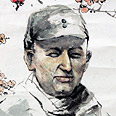
Rosenfeld's picture
צילום: איי אף פי
Jewish doctor turned 'Buddha savior' under Mao
Odyssey of young Jewish doctor who became a general under Mao Zedong after fleeing Nazis is focus of new exhibition in Vienna
Jakob Rosenfeld, a Viennese physician turned hero of the Chinese revolution, is less well-known than Norman Bethune, a Canadian doctor whose services during the Sino-Japanese war inspired Mao to write an essay that he later made compulsory reading for his People's Republic.
But the Jewish doctor - or General Luo as he was known in China - was the only one of a handful of foreign volunteers to make it into the upper echelons of the revolutionary army.
"He was even named health minister in the Communist army's provisional government in 1947," Gerd Kaminski, an Austrian expert on Chinese history and the organizer of this new exhibit at Vienna's Jewish Museum, told AFP.
The show is part of a series of events hosted by Austria marking the 35th anniversary of the establishment of diplomatic ties with Beijing in 1971.
'Buddha savior'
Nothing in the background of the young, renowned Viennese gynecologist presaged his future as the "Buddha savior" of the Red Army, as he was nicknamed.
Unlike Bethune, a militant communist who joined Mao as early as 1938, Rosenfeld "aspired only to a comfortable life shuttling between his practice and evenings at the opera," said Kaminski, who has written a book on the Jewish doctor.
Born in 1902 in Lemberg - now Lvov, in western Ukraine, but then part of the Austro-Hungarian empire - Rosenfeld, the son of a non-commissioned officer in the imperial army, narrowly escaped the fate of many Jews in Nazi Germany.
Deported to the concentration camps at Dachau and then Buchenwald, he was released in 1939 on condition that he will leave the Reich within two weeks.
"The only possibility at the time was to board a ship for Shanghai where no visa was necessary to enter the international concession," Kaminski said.
Soon known as "Little Vienna", Shanghai's Jewish neighborhood provided a refuge to some 25,000 European Jews and Rosenfeld quickly opened a practice there.
But following an encounter with a propaganda agent for Comintern, the Soviet-based international communist organization to promote the spread of the proletarian revolution, and after seeing the Chinese persecuted by the Japanese army of occupation, the Austrian decided to join Mao's New Fourth Army in 1941.
Jewish-Chinese legend
The rest is the stuff of legend - endless stories of the young doctor on the frontlines, operating tirelessly on war wounded with only the light from a flashlight. He also waged his own war to improve hygiene and trained dozens of Chinese doctors in the methods of modern medicine.
"He was a great hero and a humanist, admired by the army and the population, who saved thousands of lives and whose role was comparable to that of Bethune," China's ambassador to Austria, Lu Yonghua, told AFP.
Elevated to the rank of general, Rosenfeld tended to the elite in the Communist Party's Central Committee and forged close ties with Liu Shaoqi and Chen Yi, who would later go on to become respectively president and foreign minister of China.
"But (Rosenfeld) was never close to Mao himself," Kaminski added.
The Austrian "General Luo" chose to remain in China after the fall of the Nazi regime and participated in the Red Army's march on Beijing before returning to Vienna in 1949, the year the People's Republic of China was founded.
Back in Austria, he found a city devastated by war and still rife with anti-Semitism where he could "no longer adapt" following the extermination of his family, he wrote in his diary.
The Jewish doctor tried to return to China in 1950, but without a visa, and had to settle in
Israel where he died two years later following heart failure.
Hero again
"With the new power in place and the beginning of the Korean War, foreigners were not necessarily welcome in China anymore," Kaminski said.
Forgotten after Liu and Chen fell out of favor during the Cultural Revolution in the late 1960s, Rosenfeld was only gradually rehabilitated after Mao's death in 1976. In recent years, however, his "hero" status was restored, thanks in part to Kaminski's efforts.
"Today, he has a statue, a hospital and Beijing's National Museum of China set up an 800-square-metre (8,600 square feet) exhibit in his honor inaugurated by President
Hu Jintao," Kaminski noted.
The exhibit on Jakob Rosenfeld at Vienna's Jewish Museum will run until January 14.










